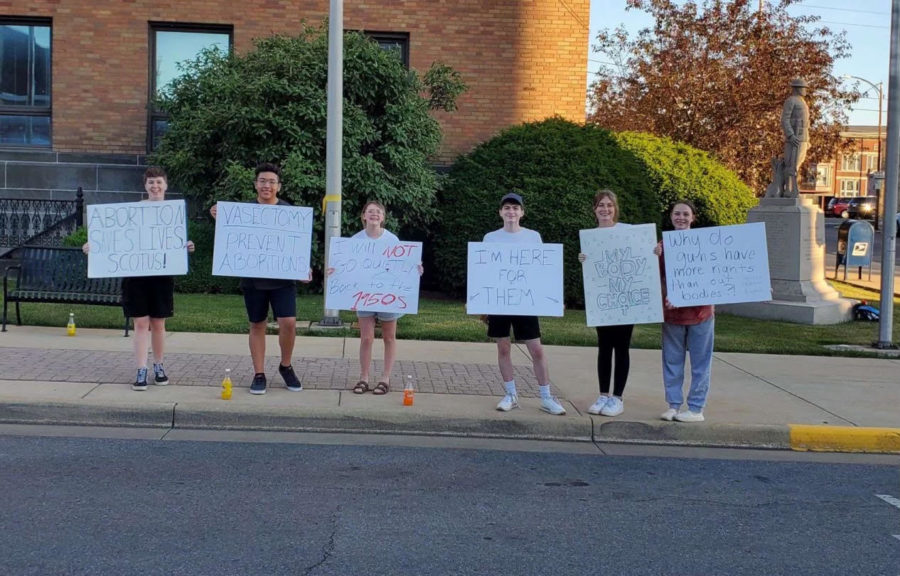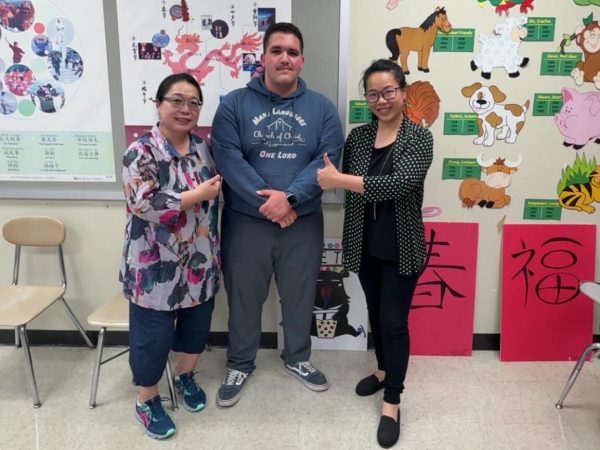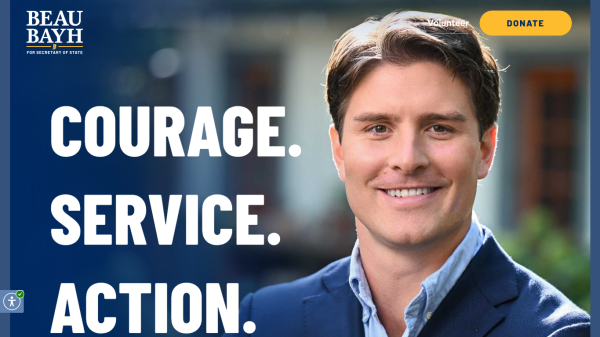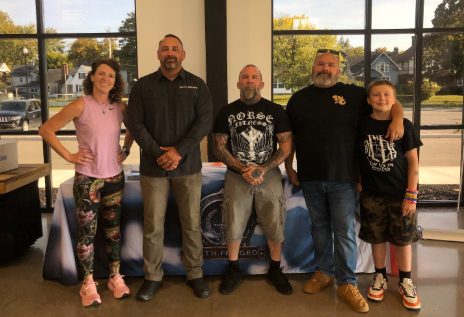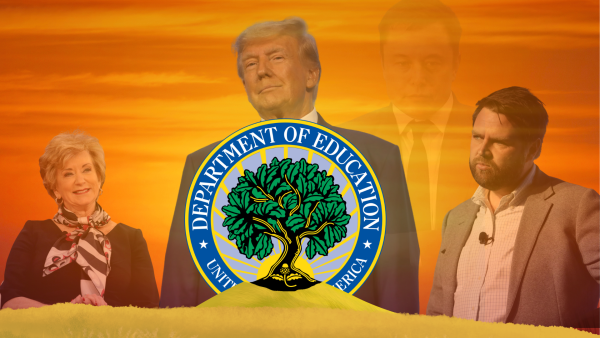Supreme Court’s Decision Embraced by Some, Raises Concerns for Others
Once Roe v. Wade got overturned, places all over the country held protests. In Logansport, students Phoenix Cripe, Ivy Padilla, Carissa Dawson, Evan Gay, Gracie Kitchell, and Lily Walthery, all participated in a peaceful protest outside of the city building.
According to Let’s Talk About Abortion Indiana, three out of five Hoosiers know someone who’s had an abortion and nearly one in four U.S. women will have an abortion in her lifetime.
In 1970, Norma McCorvey, also known as Jane Roe, a fictional name used in court documents to help protect the identity of McCorvey, filed a lawsuit against Henry Wade. McCorvey stated that the state laws were unconstitutional and abridged her right to personal privacy.
Three years later, on January 22, 1973, the U.S Supreme Court came to a 7-2 vote decision, siding with McCorvey. This provided the fundamental right to privacy, which protected a pregnant woman’s right to abortion. Since then, the Supreme Court’s decision has been a source of controversy and debate as many people have protested and voiced their opinion that abortion should be illegal.
“I am pro-life, or anti-abortion, meaning I oppose the direct, elective, intentional killing of preborn humans. I’ve come to this stance for several reasons,” parent Becky Martin said. “First, abortion is a human rights violation, striping the youngest, most vulnerable humans of the right to live, and without the basic right to life, no other rights matter. I base my beliefs on science, fact, and logic. Premise one, intentionally killing innocent humans is wrong. Premise two, elective abortion intentionally kills innocent humans.”
Martin continues to explain why she believes her reasonings on why abortion is wrong.
“Therefore, abortion is wrong. In order to disprove this, one would have to disprove premise one or two,” Martin said. “I doubt anyone wants to argue that intentionally killing innocent humans isn’t wrong and premise two is scientifically accurate. Even abortion providers, supporters, and Planned Parenthood acknowledge that abortion kills the preborn.”
On June 24, 2022, news hit that with the release of Dobbs v. Jackson Women’s Health Organization, the Supreme Court overturned Roe v. Wade and Planned Parenthood of Southeastern Pennsylvania v. Casey. This means that abortion is no longer protected at the federal level. With the overturn, now individual states will decide whether abortion is legal and what restrictions will be taken within their state boundaries.
“I felt very worried when Roe v. Wade got overturned, especially for Indiana specifically,” senior Michael Hill said. “We’ve always had very clear-cut lines and rules for abortion and how we’ve always allowed it. The idea of potentially losing that in a state where we already have such high STD counts was very worrying to me because obviously there’s a lot of sexual deviance in Indiana, so something like that would be very bad if that were to happen here.”
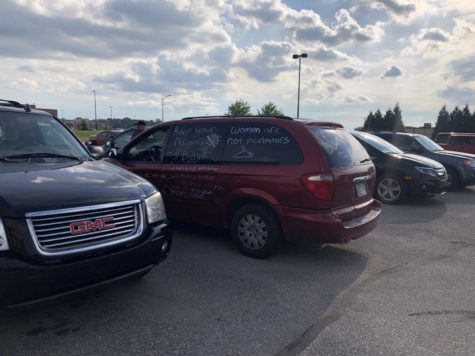
According to the Indiana Coalition to End Sexual Assault and Human Trafficking, 20% of Hoosier women have been sexually assaulted, but 85% of sexual assault cases go unreported. Indiana also ranks the fourth highest in the nation for the number of reported rape cases among high school girls. Indiana is also ranked 26 for the highest STD count per state.
Following the overturn, Indiana became the first state to pass a new abortion ban that takes effect on September 15.
“My opinion on abortion depends on the circumstances of each individual situation, but as for an overall stance, I would consider myself pro-life,” nurse Krista Frye said. “I don’t contribute any religious influences to my stance either. I just personally have such an appreciation and respect for life in general.”
Frye continues to explain her reasoning on why she believes people should preserve life if possible.
“No matter how bad a situation has been, and I have seen some bad ones, people overcome,” Frye said. “Our bodies and minds are wired for survival and for good reason. If a woman is not in a medically necessary position to sustain her life, her fetus is not the product of rape or incest, then I think life should be preserved.”
The ban however does include some exceptions. These include abortions that are permitted in cases of rape and incest before the 10 weeks post-fertilization and if a fetus is diagnosed with a lethal anomaly.
“As mentioned previously, I think that the exception to the pro-life argument would be fetuses resulting from incest relationships or rape, as well as any pregnancy that is not able to survive or where the mother’s life is in danger due to carrying the fetus,” Frye said. “My reasoning is as follows: incest relationships put children at risk for illnesses that would not be present if the child was a product of any other relationship. This is because family members carry many of the same non-dominant genes that do not affect people in their lives; however, when these people that carry the genes have a child, that child will have a gene from both parents and will be impacted. This can give them diseases that have actually killed off whole bloodlines throughout history.”
When discussing different opinions regarding abortion, pregnancy resulting in rape is often brought up.
“As for products of rape, I would consider this similar to the reasoning in why terminating a pregnancy that is causing distress to the life of the mother are allowable,” Frye said. “Health is physical and mental to achieve overall wellnesses. Forcing a pregnancy after and on top of all the trauma following sexual abuse is going to add more psychological pain. As medical professionals, we are taught to do no harm, and part of that is not knowingly allowing any unnecessary pain or injury when a pregnancy is killing the mother. We are going to save the mother that is already under our care.”
Although many people think Indiana made the right decision with the abortion ban, many are left disappointed.
“I felt a bit robbed when Roe v. Wade was overturned,” junior Carissa Dawson said. “It was like they stole something that was mine. I’ve never needed an abortion, but it should be an option. Nobody should be able to take my choices away no matter what their beliefs are.”
Dawson is concerned with others’ personal beliefs affecting her.
“I’ve also noticed that a lot of reasons people are against it are for religious reasons, but if I don’t believe in your religion, why should I be affected? There’s a separation of church and state for a reason,” Dawson said.
Two concerns people have about the law change are the effect on medical care and children who are still given up for adoption.
“Personally, I’m pro-choice because I believe that abortion is medically and otherwise necessary,” senior Mazzie Schwering said. “Abortions can save people’s lives. I personally know a disabled woman who was assaulted in her early 30s, and if she didn’t have an abortion, that pregnancy would have killed her. Some women accidentally conceive and don’t want to bring a child into this world knowing they can’t take care of it and don’t want to put that child in the overcrowded foster system of America.”
Religion is a big reason many people believe that abortion should not take place. However, that does not mean every religious person is anti-abortion.
“I believe that life begins at first breath,” Schwering said. “I grew up in a Christian household and was taught the Bible at a young age, and there was always one verse that really stood out to me; Genesis 2:7, ‘breathed into his nostrils the breath of life and it was then that the man became a living being.’ So to me, I am breathing, therefore I am alive.”
With Roe v. Wade being overturned, it has implications that could extend beyond abortion. Dobbs also raises the specter of state regulation on other health care decisions. This includes contraception, care for LGBTQ patients, fertility treatment, and end-of-life care.
“I have not directly seen any changes,” R.N. and Lactation Consultant Jacinta Langley said. “However, I do know the pregnancy resource center I volunteer at has seen an increase in crisis calls and women asking for ultrasounds.”
With the Supreme Court granting states the power to make laws as they wish regarding abortion, many people are worried that this could happen with even more federal laws.
“Unfortunately I do think that is a very big possibility,” Hill said. “If something like this gets taken away, I think something like that could also happen to anyone whether that be based on sex, religion, sexuality. This is a big deal and I think a lot of people are realizing that.”
Despite abortion being a difficult conversation and controversial topic, respect is something that people expect when talking about this topic.
“I am not the kind of person who will judge you or anything if you disagree with me, but I expect the same respect,” Dawson said. “I think it’s important to acknowledge that even though you think differently doesn’t mean you have any more rights to my body. At the end of the day, if I get an abortion, I am doing that to my body and not yours.”
People throughout the community have faced challenges with the choice of abortion firsthand.
“When I was a teenager at LHS, I became pregnant,” Martin said. “This was especially scandalous because I had always been the ‘perfect’ child, i.e. type A, never rebelled, great grades, honor societies, extra-curriculars, etc. I’d also grown up watching my parents struggle financially, and I refused to perpetuate the cycle.”
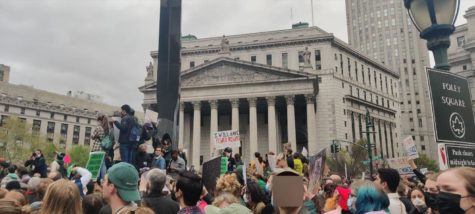
Throughout society, teen pregnancy is often frowned upon.
“Society had done an excellent job of convincing me that a baby would ruin my future, so I immediately scheduled an abortion,” Martin said. “I was going to skip school on Monday and drive down to Planned Parenthood in Indy to have the procedure. I had already completed the mandatory pre-abortion ‘counseling’ in which a woman rushed through a required script and told me they’d remove the ‘pregnancy tissue.’ She never once asked about my situation, offered parenting resources, or shared adoption information. It was clear that she wanted to get paid and move on to the next woman as quickly as possible.”
Although Martin was set on having an abortion, her plans changed.
“Before the appointment, several family members discovered my plans, came to my house and held a sort of intervention,” Martin said. “I, begrudgingly, canceled. Still the most awkward, uncomfortable experience of my life, but one for which I’ll be eternally grateful. Not only was my son’s life saved, but also mine. Living with the fact that I killed my child would have permanently scarred me. Many in the pro-life movement are post-abortive. Often their experiences with abortion are the catalyst for their pro-life conversion and advocacy.”
Even though Martin decided to carry on with her pregnancy, she remained pro-choice for a long time.
“Despite choosing life, it took a long time for me to convert from pro-choice to pro-life,” Martin said. “For years I felt defensive whenever the subject of abortion was brought up. But slowly, with the combination of age, maturity, humility, self-acceptance, and the discovery of a new, compassionate pro-life position, I began to change. The weight of a guilty conscience lifted, while peace slowly filled my mind.”
Martin explains how her decision continues to impact her life.
“Owning my actions gave me a sense of strength and purpose,” Martin said. “My heart caught fire, and I became a passionate defender of life. This has manifested itself in my life in many ways, including donating, advocating, voting, sponsoring children, and adopting three children, sharing parenting & post-abortive resources, and correcting misinformation online.”
Your donation will support the student journalists of Logansport High School. Your contribution will allow us to purchase equipment and cover our annual website hosting costs.
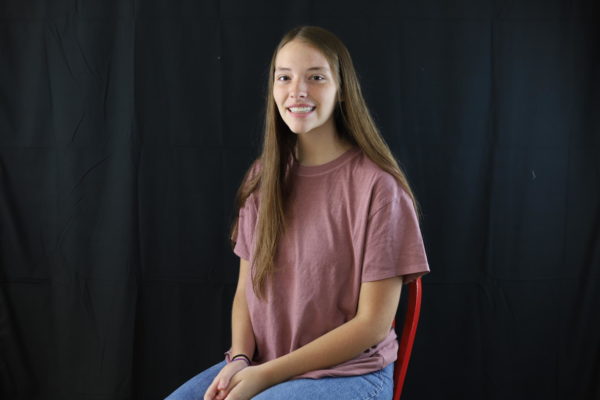
Kylee Langley is a senior and the Editor-in-Chief of Magpie. She has been on the staff for four years and has previously been the section editor for Arts...

